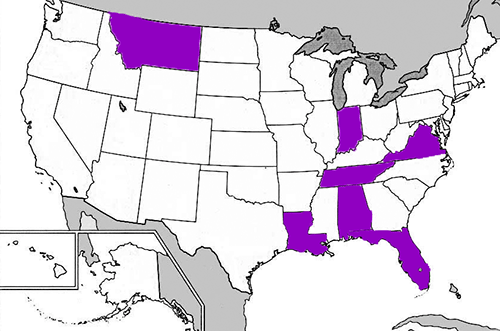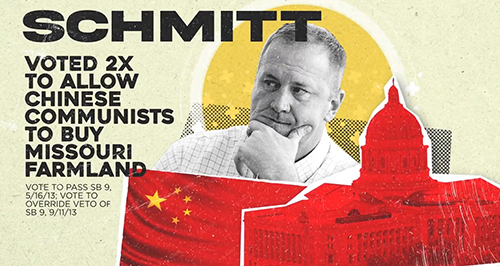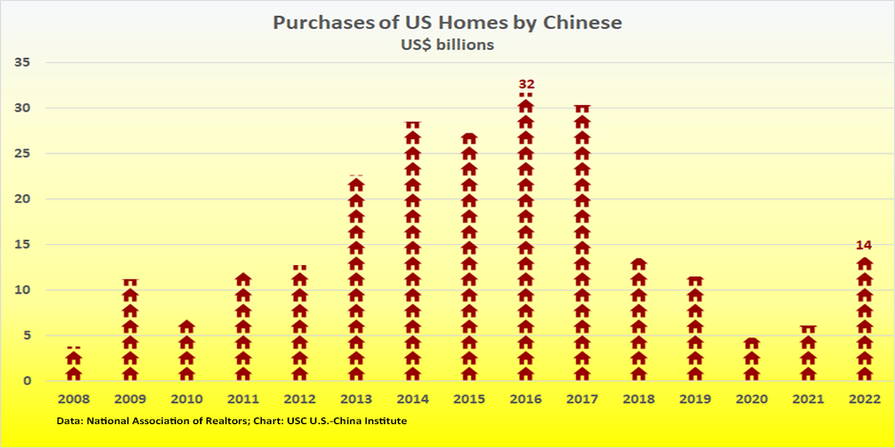A number of states have enacted laws prohibiting Chinese and others from “countries of concern” from purchasing homes or land. Florida, for instance, prohibits purchases within 10 miles (16 km) of military installations or critical infrastructure. The law is being challenged as unconstitutional by the American Civil Liberties Union and the U.S. Dept. of Justice. A federal judge is permitting enforcement of the law on national security grounds while the case proceeds. A map showing states where laws have been enacted is below. In some states the legislation applies to all real property, but in a few states (e.g., Virginia) it applies only to “agricultural land.” More than twenty other states are considering measures to restrict the purchase of property.

States with laws restricting property purchases by PRC citizens, as of August 2023.
The Florida legislation targets citizens of nations of China, North Korea, Russia, Cuba, Venezuela and Syria. The focus on China is clear. Signing the measure, Governor Ron DeSantis said, “We are following through on our commitment to crack down on Communist China.” The Virginia law targets citizens of foreign adversaries, as designated by the U.S. Department of Commerce. But Governor Glenn Youngkin has been clear that he considers China an adversary. Virginia was a finalist in the competition to bring in a Ford electric vehicle battery plant. Because Ford would use technology from a Chinese partner, Youngkin pulled his state from the competition. He said “Let me be clear, ’Made in Virginia’ cannot be a front for the Chinese Communist Party.”
According to the Virginia Agricultural Department, the most recent Chinese purchases of agricultural land in the state happened a decade ago and total Chinese holdings amount to 0.0007% of the state’s farmland. Since Virginia withdrew its application, Ford is building its plant in Michigan. It’s expected to employ 2,500 workers.
Prohibitions on foreign ownership of farm land are not new. Missouri had such a law and a Chinese company's 2013 purchase of Smithfield, the largest U.S. pork producer, generated debate over the utility of the law. Missouri amended its law to permit 1% of farm land to be foreign owned. The argument continued into the 2016 race for Missouri attorney general between State Senator Kurt Schaefer and law professor Josh Hawley. An organization called Tea Party Patriots produced an ad blaming Schaefer for "helping the Chinese buy our farms." Hawley won that election and in 2018 was elected to the U.S. Senate. The issue hasn't died in Missouri. In last year's U.S. Senate race, Tracy Busch Valentine charged that her opponent Eric Schmitt, as a member of the state legislature, voted to allow Chinese to buy farm land. Schmitt hit back saying that as attorney general he sued China for covering up the emergence of covid-19. His case was dismissed, but he won the race.

Screenshot from 2016 campaign ad.

Screenshot from 2022 campaign ad.
These ads aside, Chinese individuals and companies have not been big buyers of American farmland. Many Chinese, though, have been eager to purchase homes here. The National Association of Realtors compiles an annual report on purchases by foreigners. It’s an estimate based on a survey of members. NAR does not check passports and lumps people from Taiwan into the Chinese category. NAR says that Chinese have been the top purchasers of U.S. homes for most of the last decade. Many are recent immigrants. Pandemic restrictions limited travel from China to the U.S. in 2020 to 2022, but Chinese purchased nearly $14 billion worth of homes last year. While a jump over recent years, it’s less than half of the purchases made in 2016-2017, prior to the trade war and a tightening of China’s foreign investment rules. From April 2022 through March 2023, about a third of Chinese purchases were made in California. Florida and Texas were the second and third top destinations for such buyers.
Many have condemned this sort of legislation, likening it to the sorts of restrictions imposed on Chinese immigrants and others in the 19th century. It feeds a climate of fear and hostility at a time when anti-Asian hate crimes are on the rise.
In 2016 rising home prices drove the Canadian province of British Columbia to enact a special tax on foreign home purchases. Last year, the province raised the tax to 20% of the purchase price. The entire nation, however, has imposed a two year ban on foreign home purchases. There are exceptions for those who have paid taxes in Canada or those who have studied in the country for five years.
The U.S. prohibitions enacted thus far don’t point at a tight housing market and don’t include those from Mexico, Canada or India (the second through fourth foreign purchasers of U.S. homes). While advocates for the restrictions on Chinese purchases point to the potential security threat of Chinese projects adjacent to military bases, they have not explained how Chinese home purchases in American cities have jeopardized the security of critical infrastructure or might otherwise put U.S. national security at risk. If Chinese property ownership is a threat, does renting the same property represent a threat?
A large majority of American adults currently have an unfavorable opinion of China. Rather than addressing real security hazards, these measures are designed to score political points. They also nurture suspicions that can produce discrimination.
The chart above draws on NAR survey data for sales (for instance) from April 2022 to March 2023.
Resources
We've hosted several presentations on Chinese investment in the U.S. Two were by Dan Rosen (2013) and Cassie Gao (2018). Chinese corporate investment in the U.S. peaked at nearly $46 billion in 2016. Tighter policies in China (the government favored investment into strategic sectors and to advance Beijing's Belt and Road Initiative) and greater scrutiny in the U.S. caused that number to tumble to $10 billion in 2019 and just $2.6 billion last year.
USCI has long followed China in U.S. political campaigns. See our 2008 documentary, this 2010 newsletter, this 2012 newsletter and our China Card conference in 2016.
Anti-Asian speech and violence has risen since 2015. Our newsletter has focused on it (2021 | 2022). We convened a discussion about the sources and consequences of abuse and another on how China's rise affects attitudes towards Chinese Americans (with the 1990 Institute). Additional resources are here. The USC Asia-Pacific Islander Faculty and Staff Association has prepared an excellent allyship guide.
Asian Americans Advancing Justice has long been a strong civil rights advocate and is among the organizations documenting hate crimes. Their website includes information about bystander training and many other resources.
Click here to subscribe to the USCI newsletter. It includes information about upcoming events, professional development opportunities, and quick looks at important issues in U.S.-China relations and trends in contemporary China. Previous issues are available here.




